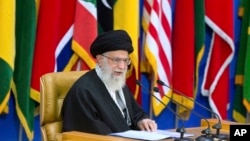Supreme Leader Ayatollah Ali Khamenei warned on Tuesday he would confront anyone trying to interfere in Iran's May presidential election, in which conservative hardliners will seek to defeat moderate President Hassan Rouhani.
Khamenei referred to major street unrest after the disputed 2009 presidential election as an overt attempt to manipulate the outcome, but said there had been other cases of attempted interference including in the 2013 vote won by Rouhani.
Khamenei, a hardliner who has the ultimate say on all major foreign and domestic policy in the Islamic Republic, did not specify what attempted tampering occurred in the 2013 election.
"I will confront anyone who wants to tamper with the results of the people's vote. In previous years and previous elections ..., it was the same. Some of it was in front of people's eyes and they became aware of it. And some of it they were not aware of but I was informed about it," he said in Iranian New Year
remarks carried live on state television.
"It was revealed in 2009 — they came out and drew battle lines. And in other years in other ways, but in all these years I stood against them and said whatever the results of the election are, they must be carried out."
Two of the candidates from the 2009 presidential election, which put hardliner Mahmoud Ahmadinejad into office for a second term despite large protests over alleged vote fraud that shook the Islamic Republic, have been under house arrest since 2011.
Mir Hussein Moussavi and Mehdi Karroubi were detained for calling for street protests at the same time that pro-democracy uprisings were convulsing Tunisia and Egypt.
In recent weeks, the hardline and moderate political camps in Iran have been gearing up for a showdown in the May 19 vote.
Rouhani has called for greater individual freedoms and highlighted the 2015 diplomatic breakthrough reached with world powers, in which Iran curbed its nuclear program in exchange for relief from international sanctions, as a signature achievement.
Conservatives hope to stop Rouhani winning a second four-year term but have yet to name their presidential candidate.
They have denounced the nuclear pact as a form of capitulation, fearing it could open up Iran to Western political and corporate influence. They have also criticized Rouhani's economic record, including difficulties in rebuilding foreign
trade and investment despite the lifting of sanctions.
Khamenei has also faulted Iran's economic performance under Rouhani. He said on Tuesday the government could have achieved more in stimulating the economy and cited unemployment as one of Iran's biggest problems.
Iran's jobless rate is 12.4 percent, according to state statistics, with about 3.2 million Iranians unemployed out of a total population of 80 million.





